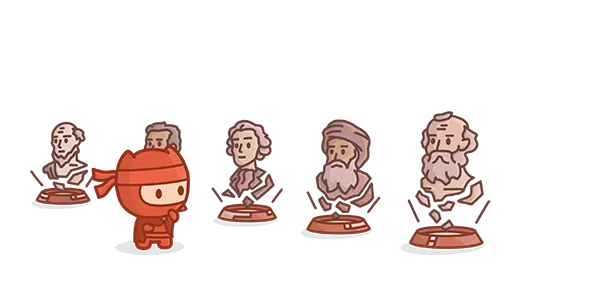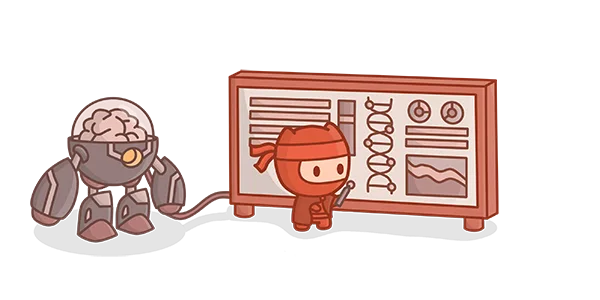
Evolving with Accuracy
Supportive Traits
Supportive traits are like great personal assistants that help us navigate through life’s challenges more smoothly. From handling day-to-day responsibilities to tackling complex issues, we often and consciously rely on these trusted aides—our supportive traits—knowing that they are capable and reliable at what they do. Ultimately, living in the absence of our supportive traits is akin to losing both our arms; we would struggle tremendously to function without them.
Your habits shape your identity,
and your identity shapes your habits.
James Clear
As our supportive traits come naturally to us, we tend to employ them effortlessly, as if we are writing and drawing with our dominant hand. Therefore, we often take our supportive traits for granted, not realizing how valuable they are to someone of a different archetype. If left unchecked, we might even run the risk of overusing them, preventing other parts of ourselves from flourishing.
Like our dominant traits, our supportive traits are simply facets of our personalities. Whether they are strengths or weaknesses is entirely dependent on the way we utilize them. If we cultivate and develop our supportive traits well, they can become valuable additions to our toolbox of super strengths. However, if we use them in an unhealthy manner, the same traits will ultimately lead to our undoing.
Principles play a monumental role in the lives of Philosophers. They believe that all actions require a strong motive and valid reason. Thus, they constantly utilize their wisdom to formulate comprehensive rules for leading a purposeful life. By engaging in deep contemplations, each insight gained contributes to the development of their core principles, guiding them towards a more meaningful existence.

Sadly, Philosophers often mistake their subjective reality for the objective truth. They usually prefer to think in solitude, believing that the noises of the outside world could corrupt their thoughts. However, this also means that they may not be exposed to sound arguments and opposing viewpoints that could change their minds. Because of that, such Philosophers are limited only to their own context, leading to flawed and rigid maxims that make sense only to them.
At the extreme end, some Philosophers may develop principles that only suit their self-interests. If they are reluctant to engage in dialogue with others, their axioms may be highly susceptible to personal bias. As a result, such Philosophers may end up using misguided principles to excuse their wrongdoings, leading to a life of deliberate ignorance. Unbeknownst to them, such behavior contradicts the very purpose of philosophy, which is to seek truth and wisdom for the betterment of all.
All great answers began with a hypothesis. Philosophers have a unique ability to figure out logical conundrums by observing and deducing patterns from even the most mundane of situations. By breaking down complex ideas into their most basic components, Philosophers can critically evaluate the root cause of a problem, leading them to a more accurate and holistic understanding of any situation.

But despite their intellectual prowess, many Philosophers often struggle to be well-integrated members of society. As individuals who think independently, they tend to make decisions without considering people’s perspectives. Because of that, their decisions can sometimes lead to negative consequences for their communities. If that occurs, the people around them may view them as self-centered, creating a barrier between them and society.
Worst of all, Philosophers may falsely believe themselves to be wholly objective and unbiased. By assuming their thoughts are absolute, they unknowingly pave a dangerous path of delusion. Such Philosophers may become entrenched in their own thinking, dismissing all external opinions that contradict their own. In doing so, they confine their vision to limited knowledge, giving them a false grasp of reality.
From human suffering to intricate ideologies, Philosophers seek to form comprehensive frameworks as a means to understand the world. They do this by piecing together fundamental ideas from everyday observations, forming an elaborate blueprint for life. Through this process, Philosophers craft holistic schemas in their minds, helping them achieve the most accurate understanding in any situation.

However, no framework is perfect. Philosophers often overestimate the practicality of their frameworks, force-fitting situations to match their expectations. They fail to realize that life is nuanced, and the perfect model to grapple reality is a nearly impossible ideal. If Philosophers continue to be close-minded, they will be trapped in their ways, living and interpreting life with a flawed perspective.
At their worst, Philosophers may come to believe that they alone hold the answers to life’s most profound questions. Trapped in this state of mind, they may insist that their frameworks are the ultimate model and reject alternative perspectives without due consideration. This is often fueled by the assumption that their model has already been thoroughly examined. Unfortunately, to most people, these Philosophers are just stubbornly defending their views even when they are clearly wrong.
Thus far, we have explored both the Philosopher's dominant and supportive traits. In our jargon, these traits are known as one's heroic traits. Think about it, don't we all look like heroes when we put these traits to use? Not just wannabe heroes, but real ones—those who are truly powerful yet unimpressed with their own abilities.

Superhuman strength and the ability to fly are awesome superpowers that we all wished we had. But Superman doesn't pride himself in any of those abilities. To him, using those powers to save the world is just another day on the job. Similarly, even though we are great at our dominant and supportive traits, we do not find them the least bit amazing. From our perspective, there is nothing special about these mundane things that we do every day.
That said, as heroic as our traits may seem, no hero in the world is perfect. Even the most powerful heroes, such as Naruto, Thor, or Wonder Woman, have their own flaws and weaknesses. However, that does not invalidate them as heroes; it only makes them all the more admirable. The same goes for our own heroic traits. They may not be perfect, but our strive to improve them is what sets us apart.
I am not a hero. I just did what any
decent person would have done.
Miep Gies
When our heroic traits bask in the light, they will inevitably cast shadows—traits that we tend to neglect. Our shadows are foreign to us, as they are the complete opposite of our natural traits. Because we fear what we don't understand, most of us will subconsciously push away or suppress these parts of ourselves. Unfortunately, if we allow the fear of failure to overpower our minds, these suppressed shadows will eventually swallow us whole.
Nevertheless, shadows are not our weaknesses. They are simply parts of ourselves that we are unfamiliar with, and therefore, would rather avoid. But if we harness our shadows, they will eventually become our hidden strengths. It may be daunting at first to explore these dark and unknown parts of ourselves. However, with a curious mind and a compassionate heart, there's nothing to be afraid of. With that said, let us venture deep into the shadows within us.
Read next section →
Shadows Within [Philosopher]